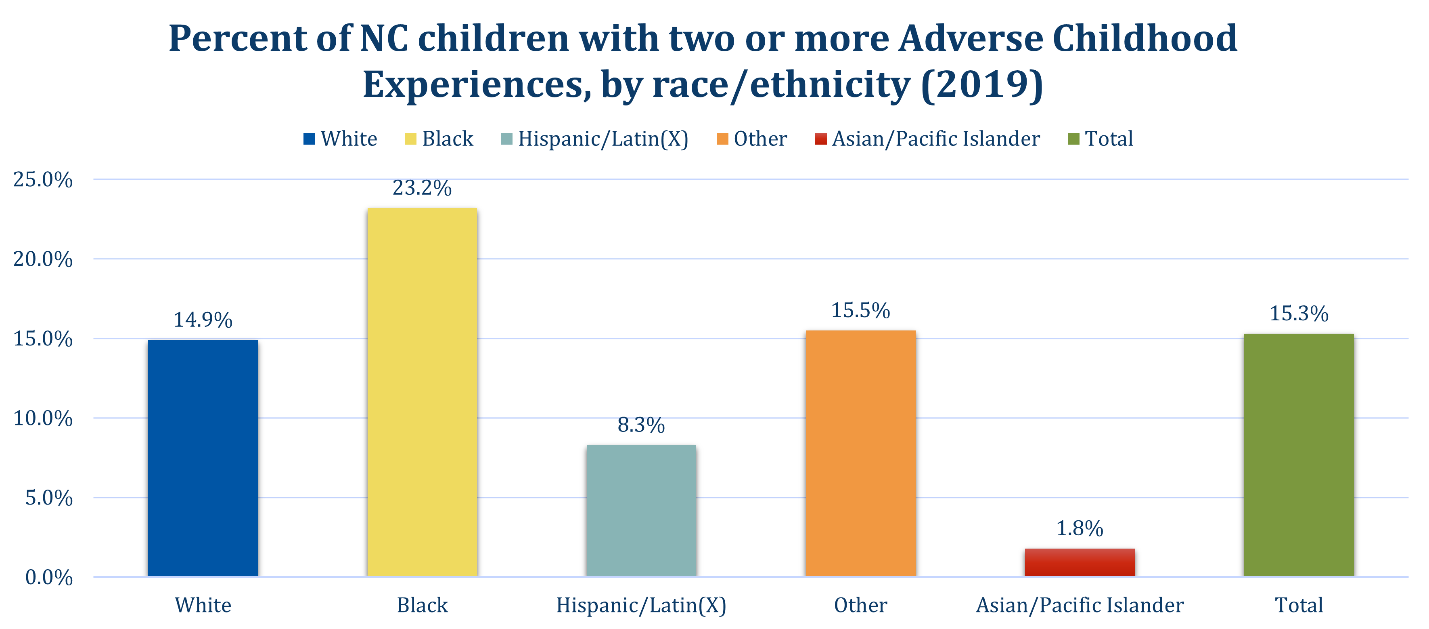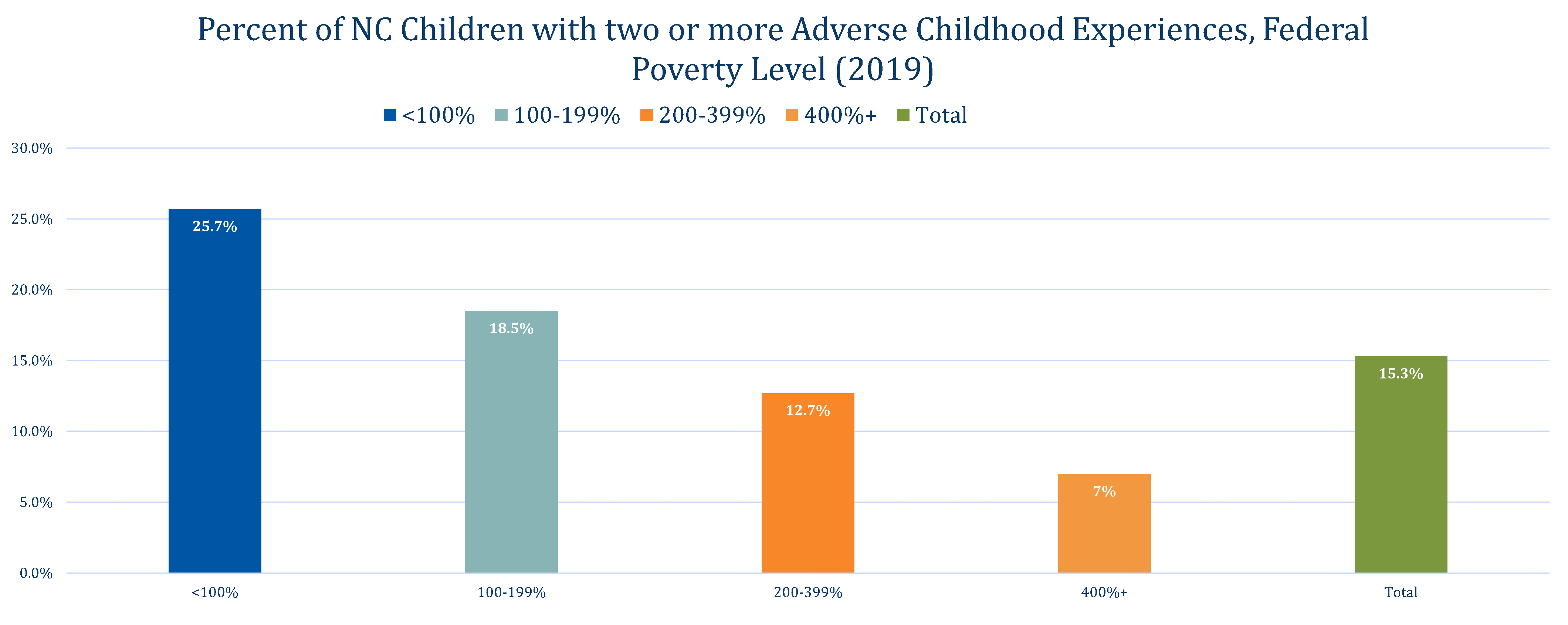

By James Coleman
As part of the NCIOM’s 38th annual health policy meeting, moderators and panelists participated in discussions around key behavioral health indicators outlined in the Healthy North Carolina 2030 (Healthy NC 2030) report and the State Health Improvement Plan, a companion report published by the North Carolina Department of Health and Human Services (NCDHHS). The implementation of trauma-informed and resilience-building practices to prevent Adverse Childhood Experiences (ACEs)[1] is an important focus area in both reports and was a major focus of the annual meeting.
Adverse experiences in childhood, such as household substance abuse, child abuse, and neglect, have been shown to impair brain architecture. Children who experience ACEs are more likely to adopt risky behaviors such as drinking, overeating, smoking, and sexual promiscuity, and these behaviors can translate into poor health and early death. Ensuring that systems and individuals working with children and families understand the ways that ACEs impact children’s health is essential to promoting safe, stable, and nurturing relationships, which are known protective factors against the impacts of ACEs.
To highlight the impact of ACEs and the policy and systems changes needed to prevent their effects in North Carolina, the second plenary session of the NCIOM annual meeting started with a brief video from North Carolina Chief Justice Paul Newby, District Attorney Ben David, and Judge Andrew Heath describing the Task Force on ACEs-Informed Courts.
Chief Justice Newby established the task force to educate judicial branch stakeholders on the impact of the exposure to ACEs on children, to equip juvenile court officials with the knowledge and tools to identify juvenile offenders and victims impacted by ACES, identify existing and design new programs to intervene and put youth on a pathway to a successful adult life, and provide a platform for court officials to offer feedback on this experience.
Following the video from the Chief Justice, Latoya Powell, Deputy General Counsel at the North Carolina Department of Public Safety, addressed the meeting attendees and provided an overview of the task force’s mission, objective, members, vision, and action plan. An edited version of Powell’s talk is available here.
Following Powell’s address, a panel moderated by Dr. Panel Lanier MSW, PhD, the Wallace Kuralt Distinguished Associate Professor at the UNC Chapel Hill School of Social Work, focused on ACEs data in North Carolina. Powell; Sharon Hirsh, President and CEO of Prevent Child Abuse North Carolina; and Jesse Kohler, MEd, Executive Director of the Campaign for Trauma-Informed Policy & Practice, served as panelists. Lanier provided an overview of ACEs and their impact on the health and well-being of children, and shared data on the current exposure to ACEs among children in North Carolina (see Graphics 1 & 2).
Graphics 1 & 2, Percent of NC Children with two or more Adverse Childhood Experiences by Race/Ethnicity and Federal Poverty Level


Powell talked about her experiences working in the juvenile justice system, seeing the impact of ACEs on juvenile offenders. She shared her vision for a trauma-informed justice system that supports families and helps children to reach their potential. Hirsh talked about ongoing efforts in North Carolina to prevent ACEs and discussed state-level prevention and policy solutions. Kohler spoke about the importance of reducing trauma exposure, mitigating the effects of trauma exposure, and improving access to trauma-focused services.
Identifying Policy Solutions to Support Families and Address Childhood Trauma: Other NCIOM Activities
In 2014–2015, the NCIOM convened the Task Force on Essentials for Childhood to develop a collaborative, evidence-based, systems-oriented, and public-health-grounded strategic plan to reduce child maltreatment and secure family well-being in North Carolina. Using the CDC’s Essentials for Childhood Framework, the task force developed a state plan for reducing child maltreatment and examined progress on recommendations issued by the 2005 NCIOM Task Force on Child Abuse Prevention, prioritizing the services, programs, and policies needed to build on this progress.
Since 2016, the NCIOM has served as the backbone organization to support the implementation of the 2015 task force recommendations by coordinating aligned work across subcontractors/partners, convening a series of workgroups, and participating in several other statewide initiatives to ensure that the recommendations are included in new and ongoing work. In 2019, the North Carolina Essentials for Childhood project announced a new focus on strategies addressing social norms change and economic supports for families (specifically centered around family-friendly workplace policies).
Over the past year, the NCIOM have published several blog posts highlights the work of Essential for Childhood and other effort to support families in North Carolina. Recent blog posts include:
Additional information on the work of the NCIOM and the 38th annual health policy meeting can be found here and here.
[1] ACEs are potentially traumatic events that occur before a child reaches the age of 18. Such experiences can interfere with a person’s health, opportunities, and stability throughout his or her lifetime—and can even affect future generations.